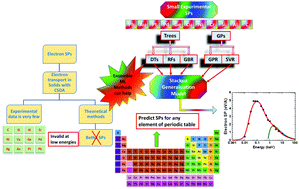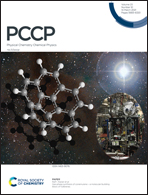Ensemble machine learning methods: predicting electron stopping powers from a small experimental database†
Abstract
Electron stopping power (SP) is of great importance in theoretical and applied research areas specifically for Monte Carlo simulation studies in many microanalysis and surface analysis techniques, radiation dosimetry, and the design of particle detectors. However, experimental data are available for a dozen elemental materials only. On the other hand, the Bethe analytical expression of the SP is applicable at high energies only whereas no generally accepted formula exists at lower energies. We employed ensemble machine learning (ML) methods with the available experimental database for the prediction of SPs of electrons with energies from 100 keV down to 1 eV, in elements over the entire periodic table. With a small training database for electron SPs, we applied various algorithms individually as well as their ensembles, which have the credibility to enhance the prediction accuracy in the case of a small training database. Based on the model's performance evaluation tests, we concluded that the stacked generalization is more accurate than the individual algorithms. Using this method, we were able to predict the electron SPs for 54 elements (in total) including 12 elements that were present in the training database as well as for 42 elements beyond the training database over a wide energy range (1 eV to 100 keV). Compared to other theoretical approaches, the ML predicted SPs show very good agreement with the available experimental data at all energies. Moreover, unlike other theoretical approaches, the ML model does not need dielectric function data and other physical parameters which involve complex calculations. Using our ML model, we have predicted SPs for a further 14 elements for which no theoretical SPs are available because of the lack of good dielectric function data.



 Please wait while we load your content...
Please wait while we load your content...